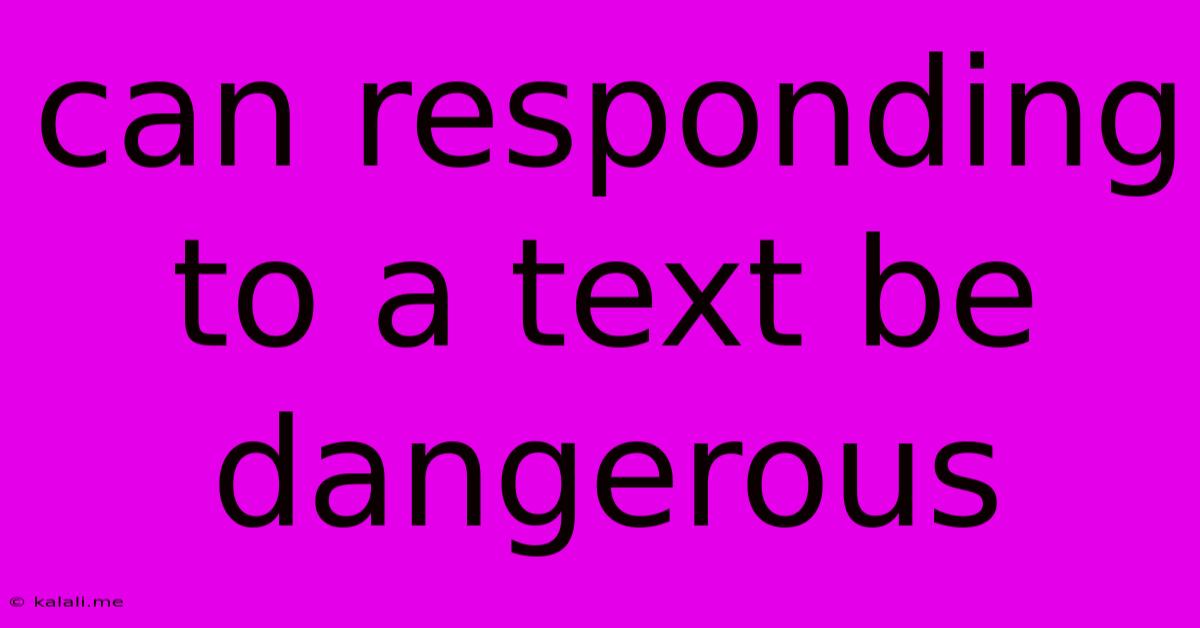Can Responding To A Text Be Dangerous
Kalali
Jun 03, 2025 · 4 min read

Table of Contents
Can Responding to a Text Be Dangerous? The Unexpected Risks of Modern Communication
Meta Description: Discover the surprising ways seemingly harmless text messages can put you at risk, from phishing scams and malware to privacy breaches and even physical danger. Learn how to stay safe in the digital age.
In today's hyper-connected world, text messaging is an integral part of daily life. But have you ever stopped to consider the potential dangers lurking behind those seemingly innocuous messages? While most texts are harmless, some can lead to significant risks, ranging from financial loss to personal safety. This article explores the unexpected dangers of responding to a text message and offers practical advice to help you stay protected.
Phishing and Smishing Scams: The Financial Threat
One of the most prevalent dangers associated with responding to texts is the rise of phishing and smishing scams. Smishing, a portmanteau of "SMS" and "phishing," uses text messages to lure victims into revealing sensitive information such as bank account details, credit card numbers, or social security numbers. These messages often appear legitimate, mimicking communications from trusted institutions like banks, online retailers, or government agencies.
Responding to these messages can be disastrous, as it often leads to identity theft, financial fraud, and significant financial losses. Be wary of texts that ask for personal information, contain suspicious links, or create a sense of urgency. Never click links in unsolicited text messages, and always verify the authenticity of a communication through official channels, such as calling the institution directly.
Malware and Viruses: The Digital Threat
Another significant risk involves the spread of malware and viruses. Some malicious text messages contain links that, when clicked, can download harmful software onto your device. This software can steal your data, compromise your privacy, or even render your phone unusable. This includes ransomware attacks, which can lock your device and demand a ransom for its release.
Think before you click. Always be suspicious of unknown senders and links from untrusted sources. Keep your phone's operating system and apps updated with the latest security patches. A strong antivirus program is also a crucial defense against digital threats.
Privacy Breaches and Doxing: The Personal Threat
Responding to certain texts can inadvertently compromise your privacy. Some messages might contain tracking links or malicious code designed to collect your personal data. This information can then be used for targeted advertising, identity theft, or even doxing, the practice of publicly revealing someone's private information without their consent.
Be mindful of the information you share in text messages, especially your location and personal details. Avoid replying to messages from unknown numbers requesting sensitive information. Consider using end-to-end encrypted messaging apps for more secure communication, such as Signal or WhatsApp.
Physical Danger: The Unexpected Risk
In some instances, responding to a text message can even pose a physical threat. This is particularly true in cases of stalking, harassment, or online threats. A seemingly innocuous text could be used to track your location, monitor your activities, or escalate a threatening situation.
If you receive a threatening text message, do not respond. Instead, save the message as evidence and report it to the appropriate authorities. Consider blocking the sender's number and informing trusted friends or family members about the situation.
Protecting Yourself from Text Message Dangers
Staying safe in the digital age requires vigilance and awareness. Here are some key steps you can take:
- Verify the Sender: Always double-check the sender's identity before responding to a message.
- Don't Click Suspicious Links: Avoid clicking links in unsolicited texts or those that seem suspicious.
- Never Share Sensitive Information: Avoid sharing personal information such as bank details, passwords, or addresses via text.
- Report Suspicious Texts: Report phishing attempts and other suspicious activity to the relevant authorities.
- Keep Your Software Updated: Regularly update your phone's operating system and security apps.
- Use Strong Passwords: Choose strong, unique passwords for all your online accounts.
- Enable Two-Factor Authentication: Add an extra layer of security to your accounts with two-factor authentication.
By understanding the potential dangers and implementing these preventative measures, you can significantly reduce your risk and safely navigate the world of text messaging. Remember, caution and awareness are your best defenses against the unexpected threats of modern communication.
Latest Posts
Latest Posts
-
How Many Elytras Are In The End
Jun 04, 2025
-
What Kind Of Caulk For Shower
Jun 04, 2025
-
How Do You Go To Work In Sims 4
Jun 04, 2025
-
In The Weekend Or On The Weekend
Jun 04, 2025
-
How To Signify An Action In Text With Punctuation
Jun 04, 2025
Related Post
Thank you for visiting our website which covers about Can Responding To A Text Be Dangerous . We hope the information provided has been useful to you. Feel free to contact us if you have any questions or need further assistance. See you next time and don't miss to bookmark.